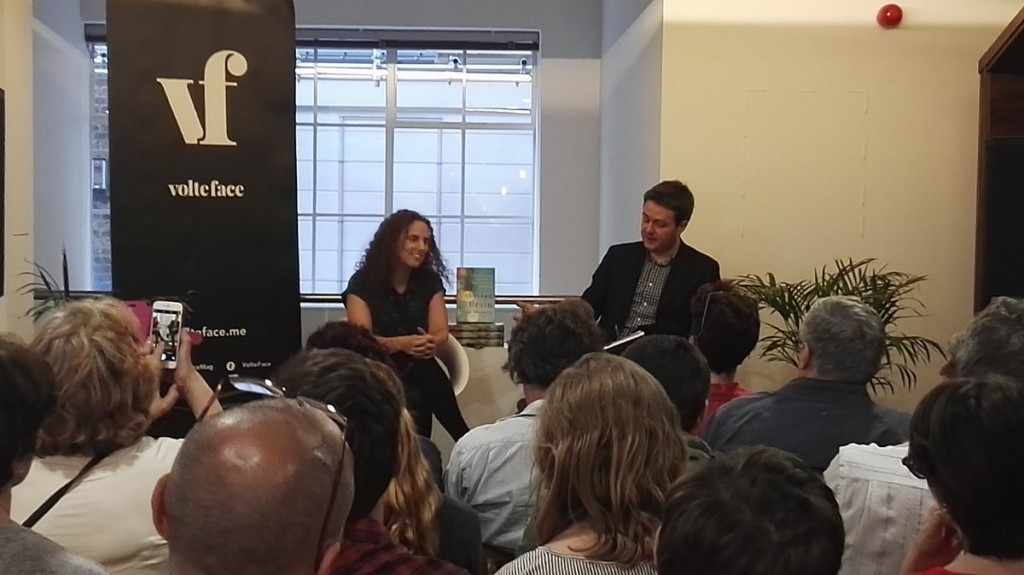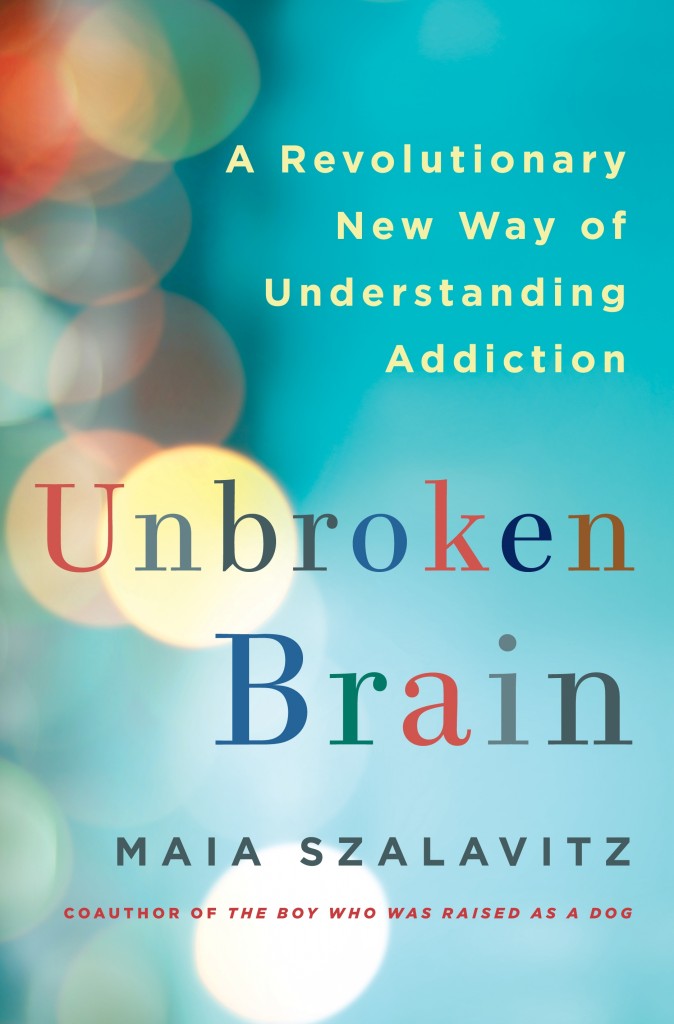It doesn’t happen often that cats and swing dancing are mentioned in passing in a conversation about doing cocaine with Jerry Garcia from the Grateful Dead, but for Maia Szalavitz it’s all in a day’s work.
She is a neuroscience journalist – one of the best ones out there, say those in the know – who has been writing about drugs and addiction for decades. A minute redhead, she has the demeanour of a happy person, with her bright eyes and clear laugh, which comes at regular intervals and ripples through her audience during the London presentation of her latest book, ‘Unbroken Brain’. It’s a study of addiction intertwined with Szalavitz’s own experience of addiction and recovery: hardly a laughing matter, yet there is chuckling throughout.
An example. Of her time as a socially anxious Columbia student in the 1980s, Szalavtiz says: “I started selling cocaine, and that was great, because then I was sure everyone wanted me to come to their party!” And although we know what’s coming – the story of how that was the beginning of years of dangerous drug addiction and dealing – we laugh with her.
It is her laugh that makes even the most difficult topics we discuss bearable; she manages to talk about them in a way that normalises without trivialising. That is a gift that translates into her book. Unbroken Brain is an exceptionally accessible and readable work for anyone: it doesn’t require a background in neuroscience or psychiatry, let alone any direct experience with drugs. I can testify that reading it feels exactly like talking to Szalavitz face-to-face: tough, but not difficult; informative, but never preaching.
Szalavitz was born in 1965 in New York state. The daughter of a Holocaust survivor, many of her early memories recall being overwhelmed by the intensity of her reactions to many aspects of everyday life in a way that, she says, always felt different to her siblings. Loud sounds, crowds and unwarranted touch all felt alien and deeply disturbing to her.
Hypersensitivity features heavily in Szalavitz’s accounts of her early experiences, alongside tales of childhood pursuits of extremely niche interests – volcanoes, for instance – which set her apart from her sisters and classmates. She writes: “My family members learned not to touch me unless I initiated it or otherwise indicated that it was okay. Paradoxically, this sometimes made me feel rejected because I couldn’t understand why I was so different.” (Interestingly, it is a well-known fact amongst addiction counsellors that many drug users report childhood suspicions of having been adopted – an early sign of the “not fitting in” sensation that Szalavitz reports.)
A high school “overachiever” – before trying any drug she would read about it comprehensively – who fulfilled her lifelong dream of being admitted into Columbia, she then had to face being suspended from college for the same cocaine dealing that had made her feel accepted and liked by her classmates.
It wasn’t long until Szalavitz started doing heroin, a habit inevitably backed by the works of William S. Burroughs and the music of Lou Reed. Heroin use later developed into powerful addiction and long recovery, but it also propelled the 23-year-old Szalavitz into the universe of American media. An experience-based article she wrote in 1990 for the Village Voice about the benefits of clean needles for drug users got her a job as a producer for television host Charlie Rose; she later worked for Barbara Walters and as a researcher for a PBS series on addiction in America.
After that, Szalavitz focused on writing: her work was featured in most major publications – from the Guardian, to Vice, to Elle. She authored and co-authored books about trauma in children and teenagers and the various ways it is treated. “Help At Any Cost”, a seminal work about the all-American phenomenon of “troubled teen camps”, sparked wide public debate and a study by the Government Accountability Institute into the abuse perpetrated in those camps.
Szalavitz fought hard to combat the perception that horrific instances of mistreatment were the exception rather than the rule. She spoke to countless teens who had been sent to “wilderness camps” to curb their drug use or misbehaviours, and had essentially been abandoned in the woods to provide for themselves.
Why did she do it? “Because no one else did, and there was no research on the topic,” she says. In part, this is also the idea behind Unbroken Brain: the rebranding of addiction as a learning disorder, rather than a moral flaw or a disease, has been floating around scientific circles for a long time now. However, as Szalavitz says, it hasn’t been put forward to the public in clear layman language – until now.

Maia Szalavitz in conversation with Johann Hari at the ‘Unbroken Brain’ book launch hosted by Volteface. (Source: Drugs and Me)
[READ] Maia Szalavitz on ‘Unlearning Addiction’
Today, Szalavitz is widely recognised as one of the best American writers on addiction and drug use. “Of the countless writers out there whose focus is addiction, no one can begin to touch the brilliance of Maia Szalavitz,” one reviewer wrote.
At the talk in London, she is frank about how she got where she is now. On getting her first job thanks to her piece on clean needles, she says: “It almost certainly helped that I look nothing like the racist and gendered stereotype of a heroin addict.” She is acutely aware of the importance of gender, race and social status in public perception of drugs; indeed, all her writing is peppered by references to racism and drug policies, such as the early public demonising of marijuana and cocaine as “Mexican” or “black” drugs, or the racial connotations of the 1980s crack epidemic.
Somewhat surprisingly, Szalavitz rejects the idea that she might be an authority on drug use and abuse because of her experience: “In the addiction field – not to undermine my own expertise – too much weight is put on experience. But in this case personal experience gave me empathy for a group that is very stigmatised.”
So, when Maia Szalavitz is not visiting the UK or New Zealand or giving talks across the US, she swing dances and looks after her cat. (She is also a prolific tweeter of cat photos.) She shares both interests with her husband, who she met on a “really nerdy dating site” for people interested in science.
When talking about him, she beams: “He’s really great. ’Husband!’ That’s a word I never thought I’d use!” As for the coke, heroin and the heady days when she self-medicated her anxieties, she says the yearning has faded entirely. She mentions – as many do – that if she was ever to do drugs again she’d wait until her 90s. “These days I’m overwhelmed with gratitude about how good my life is, so I wouldn’t want to mess that up,” she recently wrote in an email.
Szalavitz could have been many things. She thinks that without her experience with addiction (the “detour”, as she calls it) she might have overcome her “squeamishness about slicing rat brains” and gone into neuroscientific research. Listening to her speak, it’s easy to think she would have also made a great teacher or professor. Or perhaps she would have ended up doing exactly what she is doing now: as she says, “I’m the kind of person who gets obsessed with a subject and it is quite possible I would’ve gotten obsessed with [the study of addiction] anyway.”
We can only be grateful that Szalavitz has made it to a point of her career where she is able to speak publicly, because what she says is crystal clear enough to truly hold the potential for change. Her very persona challenges ingrained perceptions of drug users – partly due to who she was (“a white Columbia student – not your typical junkie”) and partly due to who she has become: “one of the bravest, smartest writers about addiction anywhere,” as one reviewer put it.
Asked to sum up her theory about the nature of addiction – not a disease, not a moral issue – she answers: “The best analogy is love. You want to be with ‘him’ no matter what – if that’s what keeps you going, then that comes before anything that’s in the way. Why do people persist despite the consequences? How do your priorities get so distorted that you fight for something that hurts you?”
This sentence on its own isn’t going to change the public perception of addiction that has been built throughout centuries of moralising and demonising, but it goes some way towards letting us into Szalavitz’s universe of empathy. And perhaps it’s already struck a chord, because the loud applause at the end of her talk has a discernible hint of affection to it. She smiles brightly and steps off the stage.
Laura Gozzi is one of our regular writers. Tweets @lauragzzi
You can purchase ‘Unbroken Brain: A Revolutionary New Way of Understanding Addiction’ here, and you can watch ‘Maia Szalavitz in conversation with Johann Hari’ on the VolteFace Facebook page.

